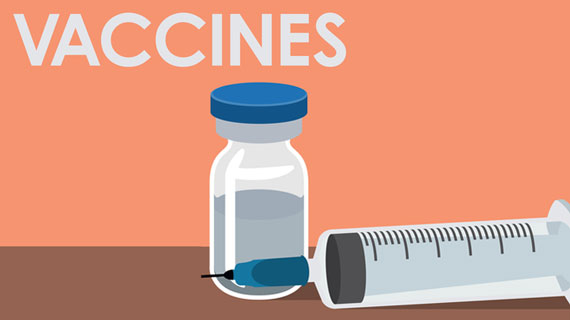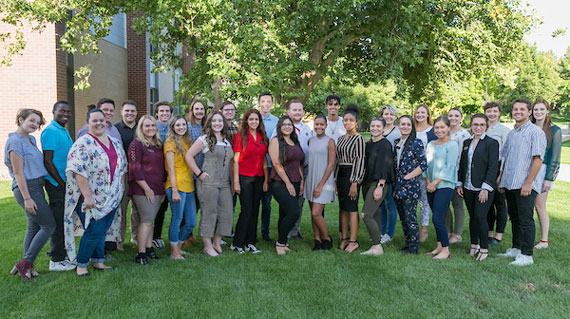Pizza & Politics Focuses on Vaccinations
Posted: December 15, 2018 | Author: Cami Mathews | Read Time: 5 minutes
 The Michael O. Leavitt Center for Politics and Public Service hosts Pizza & Politics every Wednesday at noon to discuss a current political topic. Leavitt Center student employees research the topic and moderate the conversation. These discussions expose students to a variety of important issues and encourages them to share their own perspectives while learning all sides of an issue. Free pizza is provided for all who attend.
The Michael O. Leavitt Center for Politics and Public Service hosts Pizza & Politics every Wednesday at noon to discuss a current political topic. Leavitt Center student employees research the topic and moderate the conversation. These discussions expose students to a variety of important issues and encourages them to share their own perspectives while learning all sides of an issue. Free pizza is provided for all who attend.
The final Pizza & Politics fall semester discussion was held on November 14. Moderators Morgan Barney and Savannah Robinson presented on vaccines. Morgan is a senior from Hatch, Utah majoring in Spanish with a minor in creative writing and legal studies. Savannah is a sophomore majoring in philosophy and political science and minoring in legal studies from Las Vegas, Nevada.
The topic of vaccines received top votes from the student body when polled at the beginning of the semester. From anti-vaxxers to passionate health care workers, the audience was full and ready to debate.
To start, it should be known that vaccines expose a person to a very small amount of viruses or bacteria that have been weakened or killed. A person’s immune system then learns to recognize and attack the infection if exposed to it later in life.
There are three different types of vaccines.
- Live vaccines use a weakened form of a live virus. This form is not safe for those with weakened immune systems.
- Killed, or inactive, vaccines are made from a protein or other small pieces taken from a virus or bacteria.
- Biosynthetic vaccines contain man made substances that are very similar to pieces of the virus or bacteria.
Should live vaccines be used when other options are available?
A majority of the audience didn’t know enough on the topic to understand the different usages of each vaccine. The general consensus was that healthcare professionals would use vaccines that are most helpful to humanity. Some were skeptical saying they would use the most expensive option, which did become a concern throughout the discussion.
Should everyone in Utah be required to receive mandatory vaccines?
To give background information, the Centers for Disease Control and Prevention (CDC) recommends getting 29 doses of nine vaccines for children aged zero to six. The suggestion also includes a yearly flu shot after six months old.
Mandatory vaccines for children in kindergarten are:
- 5 Diphtheria, Pertussis/Whooping Cough, Tetanus
- 4 Polio
- 2 Measles, Mumps, Rubella (MMR)
- 3 Hepatitis B
- 2 Hepatitis A
- 2 Varicella (Chickenpox)
Mandatory vaccines for children in seventh grade are:
- 1 Diphtheria, Pertussis, Tetanus
- 3 Hepatitis B
- 2 Varicella (Chickenpox)
- 1 Meningococcal
In Utah, there are two routes for vaccine exemption. The first is medical which requires forms from a physician. People with immunodeficiency disorders are exempt from vaccines. The other way is through religious or personal reasons. In this case, parents must pay a $25 fee and fill out required documentation provided by the Utah Department of Health.
Students commenting on this question did not think that there should be any religious or personal exemptions from vaccines. They stated their concerns about people making up reasons to avoid vaccines which hurt those children as well as their peers. Some comments did say the government should not be involved in religious or personal choices.
Do the pros of vaccines outweigh the cons?
Pros include saving lives, herd immunity, and saving money on healthcare over the years. Cons are some dangerous and/or fatal side effects and harmful ingredients in vaccines. A majority of audience members said the pros more than outweigh the cons. Most vaccines are 90 - 99 percent effective in preventing diseases. Children are more likely to get bullied or addicted to drugs than to have a fatal reaction to a vaccine.
Should there be more research surrounding the side effects of vaccines, particularly in Autism?
In 1998, Andrew Wakefield published an article in a medical journal claiming a link between the MMR vaccine and autism. After a lengthy investigation, it was found that Wakefield falsified his data. At least 12 follow-up studies were done, none of which found any evidence that vaccines cause autism.
Not one person in attendance at this Pizza & Politics discussion thought vaccines cause autism. The conversation highlighted the harm that comes from that narrative. One, it proves that no matter the data presented, people will believe what they believe. Two, it reveals that people would rather have a child suffer from Polio or Hepatitis B than be autistic. The conversation suggests that those with autism are worse off than children who die from a preventable disease.
Is it ethical to test vaccines on animals?
This question incited the most debate of the entire discussion. Currently, all vaccines must undergo extreme testing, which typically includes testing on animals. Researchers test vaccines on mice, rats, and monkeys by giving the disease to the animal. The researchers then test different types of vaccines on uninfected animals. An example is the polio vaccine that underwent 40 years of animal testing before being FDA approved for human use.
Not a lot of people enjoyed the idea of putting animals through pain and suffering to find a suitable vaccine. However, the alternative is putting humans through that suffering which is a worse thought for some. People did suggest that science has progressed enough to create cells similar to humans that would save animals from harmful testing.
This was another example of ethics versus money. Sure, it would be better to create fake cells that scientists could use for testing. But the money, research, and development of these would cost a lot more than finding some lab rats. People generally do not trust the healthcare industry, saying they will always test on animals because it is easier and cheaper for all.
For more information on Pizza & Politics, visit the Leavitt Center website.
This article was published more than 3 years ago and might contain outdated information or broken links. As a result, its accuracy cannot be guaranteed.
Tags: Student Leavitt Center



